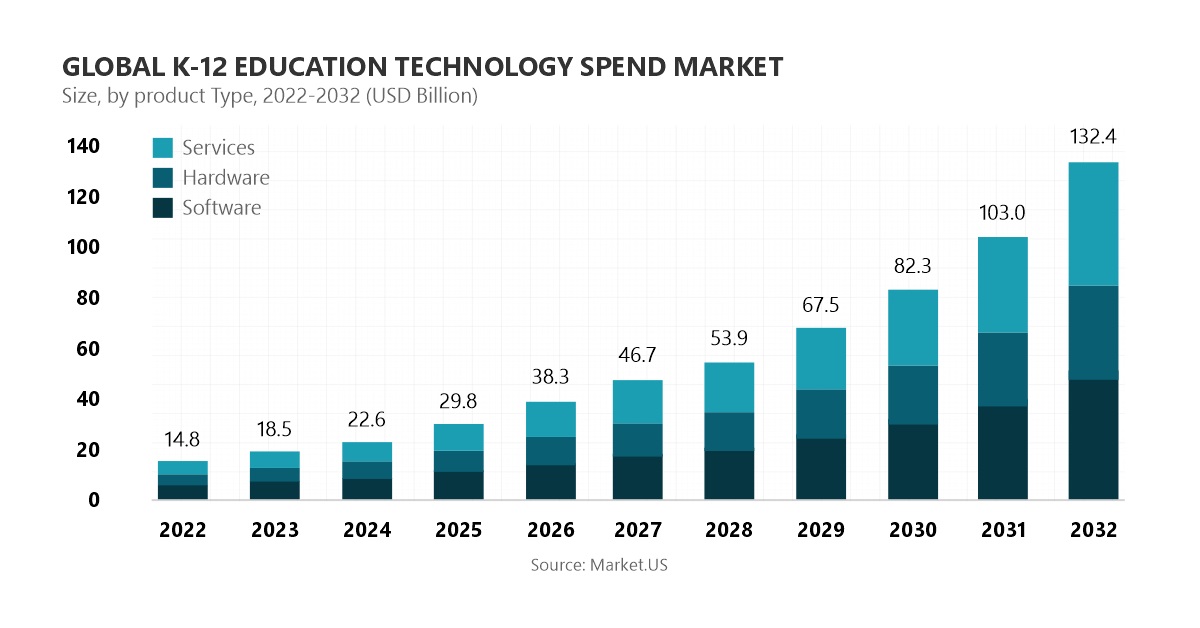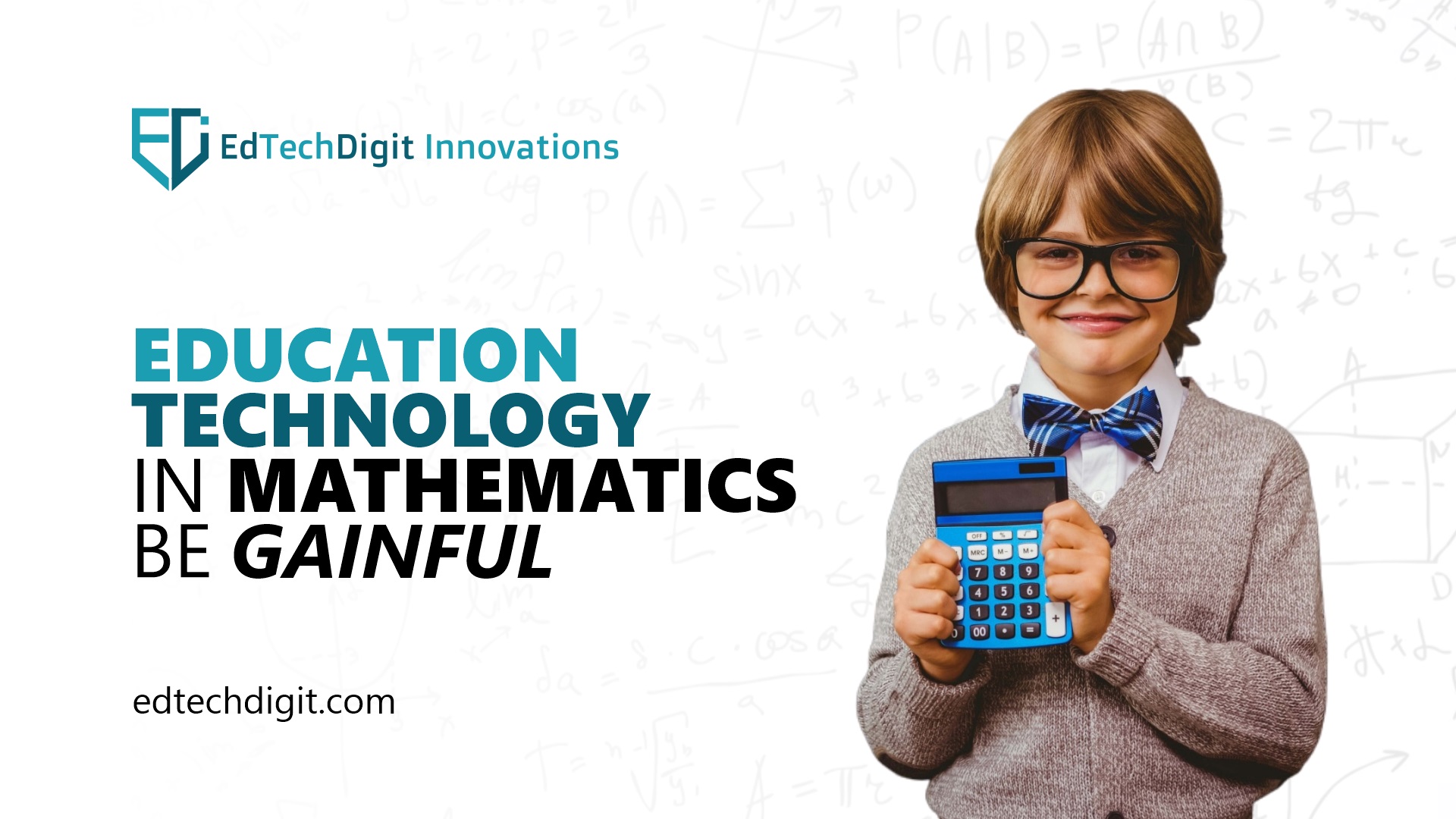
Record numbers of U.S. students severely struggle with math, but only a fraction of them receive screening and support targeting potential math disabilities. Adding to the above number, only 15% of teachers said their students have been screened for dyscalculia, a learning disorder that affects a person’s ability to understand number-based information and math. These concerns reveal greater meaning in the wake of a staggering surge in education technology in higher education.

Today, the global market for K-12 education technology expenditure is expected to grow at a CAGR of 25.2% with an astounding forecast of reaching the USD 132.4 billion mark by 2032 (Market.US). This is an incredible fleet at which educational technology investments are streamed to progress shortly.
Not just one subject, these educational technology landmarks are expected across a wide array of disciplines; be it mathematics, science, engineering, computer science, and others.

For some students, the learning struggles may be due to an underlying disability that may be affecting calculation or problem-solving skills. However, most learners struggle while dealing with numbers. Let us look at some of the key trends that are revolutionizing the way kids learn, engage, and explore the world of technology and education.
- STEAM-POWERED ADVENTURES
Science, technology, Engineering, Arts, and Mathematics are taken care of at this stage via interactive projects enhancing their problem-solving abilities and igniting critical thinking.
- CODING QUESTS
Adventure games, apps, and creative projects turn complex concepts into a thoroughly exciting project; enhancing the creative instincts of the learners across age groups with coding at its nuclei.
- VIRTUAL FIELD TRIPS
Educational technology has surpassed the bounds of a classroom and has entered the virtual adventure space; while delivering the most insightful experience of exotic locations, historical wonders, and outer space; right here inside the classrooms.
- MINDFULNESS
Mastering calming techniques promotes their emotional resilience and enhances their ability to focus on young learners.
- DIY SCIENCE PROJECTS
DIY projects captivate the interest of learners who work with technology in schools; transform abstract space concepts and foster exploration and discovery.
- INCLUSIVE STORYTIME ADVENTURES
Literature induces diversity and inclusion while celebrating differences, cultivating empathy, and offering a gateway to live the characters in an enjoyable format.
- OUTDOOR LEARNING
Natural expeditions and staying closer to the environment keep the learners' attention spans glued for longer; while fostering eco-friendly projects for educational use and empowering responsibility toward nature.
- CREATIVE ARTS
Merging creativity in learning has a lasting impact on the learners' ability to imagine, and stimulate in the given environment. It fosters their motor skills development and teaches concepts of shapes, colors, and basic math quite vividly.
- INTERACTIVE MATHEMATICS
Numbers have always been a struggle area for students across ages. Tech schools online have come up with a diverse range of exercises and activities that involve the learners and enhance their capabilities at handling numbers via different math challenges and making them into problem-solvers in an enjoyable manner.
- DIGITAL STORYTELLING
Deploying digital tools to create their storyboard, learners are pivoted toward a threshold of enhancement and digital storytelling. This enhances their literacy skills and empowers them to express their creativity in a tech-driven world with ease.

Establishing a robust mathematical culture in society begins with a focus on younger children, whose early experiences lay the foundation for lifelong subject engagement. Having said that, the learners from low-income families; sustaining a higher risk of falling behind in early math, can particularly benefit from technological interventions. Rocket Math, Prodigy, DragonBox, IXL, SplashLearn, and many other digital learning apps for mathematics are available around the world. These not only facilitate learning but also drive the zeal of every learner to enhance their numeric skills manifold.
FAQs:
- Does technology impact math learning effectively?
This is a clear stance that technology in education specifically in mathematics lends massive gains at making it interactive, and personalized. Immediate feedback and access to a wide range of resources make mathematics learning fruitful.
- Can technology in math help students struggle with traditional methods?
Using interactive tools and designing customized learning plans can cater to diverse learning patterns; making mathematics more accessible and comprehensible for every learner.
- Are there any downsides of math learning technology?
While technology in schools offers numerous benefits, over-reliance can lead to reduced basic math skills and face-to-face number interaction.

